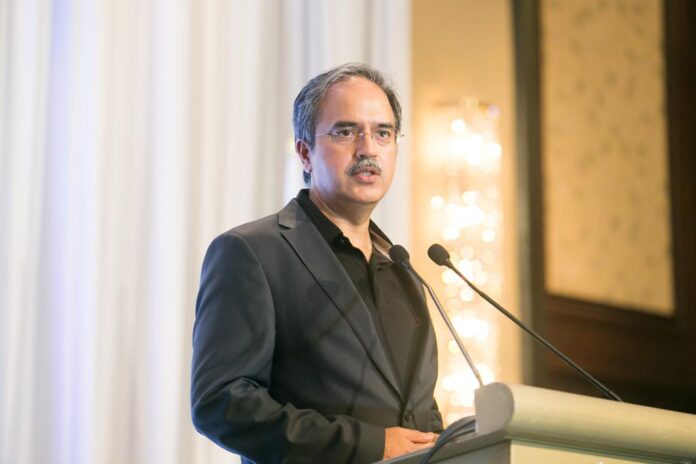UNITED NATIONS, Mar 28 (APP): Pakistan has called for a multilateral approach approach to achieve the goal of a ‘zero-waste’ world, as the UN chief warned that “toxin-filled waste is seeping into our soil, our water, and our air.”
Pakistani and global perspectives on the key subject figured at a meeting held in UN General Assembly hall at the UN headquarters in New York to mark International Day of Zero Waste.
The event was organized by was arranged by the UN Environment Programme (UNEP) and UN-HABITAT in cooperation with the Permanent Mission of Turkiye to the UN with the support of Zero Waste Foundation.
Fashion is under the spotlight for this year’s international day, underscoring staggering resource consumption and pollution levels. It is an industry where trends change rapidly, garments are often discarded after being worn a handful of times.
Speaking on the occasion, Ambassador Asim Iftikhar Ahmad, permanent representative-designate of Pakistan to the UN, emphasized he need for sustainable waste management practices and enhanced multilateral cooperation to address the mounting waste crisis.
He commended Türkiye’s leadership in raising awareness about this crucial issue, and lauded First Lady Emine Erdogan for her consistent advocacy
and leadership in promoting environmental sustainability.
In this regard, Ambassador Asim underscored the alarming statistics– 2.3 billion tonnes of municipal solid waste generated annually, over 1 billion
tonnes of food wasted each year while 29% of the global population faces food insecurity, and 92 million tonnes of textile waste accumulating worldwide.
“We are undoubtedly in the midst of a global waste crisis,” he stated
The concept of zero waste is deeply embedded in Pakistan’s culture and religious values, the Pakistani envoy said, noting that despite numerous challenges,
Pakistan is actively working to support the zero-waste movement through national policies and initiatives, including national solid waste management and national hazardous waste management policies; a nationwide ban on single-use plastic bags; the “Living Indus” initiative, aimed at establishing zero-waste cities along the Indus Basin.
Recognizing the challenges faced by developing countries in achieving zero waste, Ambassador Asim stressed the need for special and differential treatment, capacity-building, technology transfer, and financial support to facilitate sustainable waste management.
Ambassador Asim highlighted Pakistan’s textile sector—one of the world’s largest producers—as an example where sustainable waste management in fashion and textiles can significantly impact global waste reduction. He also stressed that many developing countries serve as hubs for used and recycled textiles, fostering a strong culture of reuse and preservation.
“Promoting zero waste in this sector would benefit from holistic measures and diverse experiences, while taking into account the needs of all countries, th Pakistani envoy added.
Pakistan, he said, welcomed global efforts to address waste, particularly the ongoing negotiations for a legally binding international agreement on plastic pollution.
Opening the discussion, UN Secretary-General Antonio Guterres focused on fashion and called for urgent action to curb the textile industry’s devastating impact on the planet.
“Dressing to kill could kill the planet,” he stressed.
The fashion industry is one of the world’s most polluting sectors, responsible for up to eight per cent of global greenhouse gas emissions.
It consumes vast amounts of water – 215 trillion litres annually, equivalent to 86 million Olympic-sized swimming pools – and relies on thousands of chemicals, many of them harmful to human health and ecosystems.
Despite these staggering figures, clothing is being produced and discarded at an unprecedented rate, driven by business models that prioritize speed and disposability over sustainability.
Guterres cautioned that the waste crisis in fashion is only a symptom of a much larger global problem.
Humans globally generate more than two billion tonnes of waste each year – enough to wrap around the planet 25 times if packed into standard shipping containers – polluting land, air and water, disproportionately affecting the poorest communities.
“The rich world is flooding the Global South with garbage, from obsolete computers to single-use plastics,” he said.
Many countries lack the infrastructure to process even a fraction of what is dumped on their shores, leading to increased pollution and hazardous working conditions for waste pickers.
Experts estimate that doubling the lifespan of clothing could reduce greenhouse gas emissions by 44 per cent.
However, it is also an industry with exciting opportunities to transform lives and livelihoods for the better.
“Designers are experimenting with recycled materials. Consumers are increasingly demanding sustainability. In many countries, resale markets are booming,” Guterres said, urging everyone to contribute to the fight against waste.
Governments, he said, must enact policies and regulations that promote sustainability and zero-waste initiatives.
Businesses must move beyond “greenwashing” and take real steps to reduce waste, increase circularity, and improve resource efficiency across supply chains.
Consumers, in turn, can play a crucial role by making environmentally responsible choices – valuing durable products, reducing excessive consumption, and embracing resale markets.
“There is no space for greenwashing,” he emphasized. “Businesses must increase circularity, waste reduction, and resource efficiency across their supply chains.”
Beyond the fashion industry, the broader fight against waste requires global coordination, he added.
More than a billion people live in slums or informal settlements without proper waste management, leading to severe health risks. Unregulated dumping and poor waste disposal practices are exacerbating pollution and biodiversity loss worldwide.
“Let us commit to do our part to clean up our act, and build a healthier, more sustainable world for us all,” Guterres concluded.

